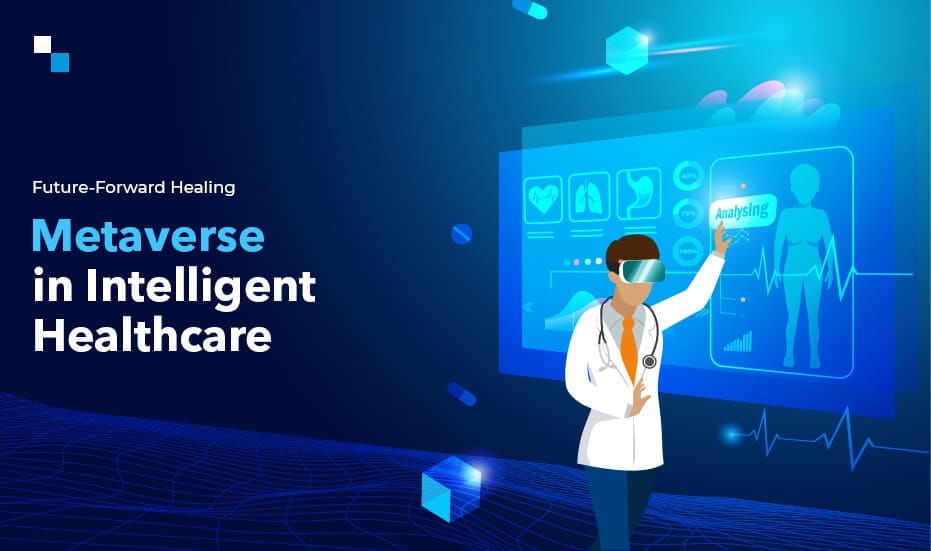The rapid advancement of technology has opened up new possibilities in various industries, and healthcare is no exception. With the rise of the metaverse and the integration of artificial intelligence (AI), we are witnessing the development of metaverse for intelligent healthcare solutions that offer immense potential for improving patient care and revolutionizing the healthcare industry.
In this article, we will explore the significance of metaverse healthcare statistics, the benefits of integrating AI into healthcare, the key factors driving the development of metaverse healthcare, and how a seasoned metaverse healthcare development company can harness the immense potential of this technology to reshape the future of healthcare.
Metaverse Healthcare Statistics
As the metaverse expands, so does its impact on metaverse healthcare development solutions. According to recent statistics, the market for metaverse healthcare is projected to reach a valuation of $52.9 billion by 2028. This exponential growth can be attributed to the numerous advantages offered by the combination of metaverse and healthcare.
Growth Factors
The metaverse has emerged as a groundbreaking platform with immense potential for revolutionizing healthcare. The growth factors behind the development of metaverse for intelligent healthcare are truly captivating and hold promise for a brighter future.
First and foremost, the metaverse brings a sense of accessibility and inclusivity to healthcare services. Through virtual reality and augmented reality technologies, individuals can access expert medical advice, consultations, and even physical therapy sessions from the comfort of their own homes. This not only eliminates geographical constraints but also reduces the burden on healthcare facilities. Moreover, the metaverse allows for meaningful collaborations between healthcare professionals and researchers worldwide, fostering a global community of knowledge and expertise. Specialists from different corners of the world can come together in a shared virtual space to exchange ideas, discuss challenging cases, and collectively contribute to medical advancements. Additionally, the metaverse healthcare development solutions have the potential to improve patient outcomes by enhancing healthcare education and training.
Medical students and professionals can immerse themselves in realistic simulations, practicing complex surgical procedures or emergencies, thus honing their skills in a safe and controlled environment. Overall, the growth factors propelling metaverse healthcare paint a promising picture of a future where technology seamlessly integrates with healthcare, bringing progress, accessibility, and collaboration to the forefront.
How Integrating AI Helps
The integration of AI takes metaverse healthcare to a whole new level. Through AI-powered algorithms, healthcare providers can collect and analyze vast amounts of patient data, enabling more accurate diagnoses and personalized treatment plans. AI can assist in processing complex medical images, such as MRIs and CT scans, helping healthcare professionals identify anomalies and make informed decisions. Moreover, AI-powered chatbots and virtual assistants can provide immediate answers to patients’ queries and offer guidance in real time, improving the overall patient experience. However, you need to find an experienced metaverse healthcare development company to harness the potential of AI rightfully.

Benefits of Metaverse Healthcare
Metaverse healthcare development solutions come with a wide range of benefits. Some of them are mentioned below:
- Enhanced Communication: Metaverse healthcare fosters seamless communication between healthcare professionals, patients, and caregivers. The virtual environment allows for instant collaboration and knowledge sharing, leading to faster and more effective healthcare decisions.
- Remote Patient Monitoring: Metaverse healthcare enables remote patient monitoring, allowing healthcare providers to keep track of patients’ vital signs and health data in real time. This remote monitoring facilitates early detection of any abnormalities or potential health risks, enabling timely interventions and reducing hospital readmissions.
- Patient Education: Through the metaverse, patients can access educational resources, virtual support groups, and interactive simulations to enhance their understanding of their health conditions. This empowerment leads to better patient engagement and adherence to treatment plans.
- Addressing Accessibility Challenges: The development of metaverse for intelligent healthcare breaks down geographical barriers, allowing patients in remote areas or with mobility limitations to access quality healthcare services. Through virtual consultations and telehealth initiatives, patients can receive expert medical advice from the comfort of their homes.
- Training and Development: Metaverse healthcare offers a unique platform for healthcare professionals to enhance their skills and knowledge through virtual training simulations and immersive experiences. This ensures that medical practitioners are continuously updated with the latest advancements and best practices in their respective fields.
Key Factors for Metaverse Healthcare Development
Several key factors are driving the development of metaverse for intelligent healthcare:
- Robust Connectivity: The successful implementation of metaverse healthcare relies on high-speed, reliable internet connectivity. Seamless transmission of data and real-time interactions between healthcare providers and patients is vital for the effectiveness of metaverse healthcare.
- Data Privacy and Security: As healthcare data becomes more digitized, ensuring the privacy and security of patient information is paramount. Tight regulations and robust cybersecurity measures need to be in place to protect sensitive medical data from unauthorized access.
- User-Friendly Interfaces: Metaverse healthcare platforms should have intuitive and user-friendly interfaces that cater to users of all age groups and technological proficiency. A seamless user experience is crucial in promoting widespread adoption and acceptance of metaverse healthcare.
- Collaboration between Stakeholders: The successful development of metaverse healthcare requires collaboration between technology developers, healthcare providers, researchers, and regulatory bodies. By working together, these stakeholders can ensure that metaverse healthcare solutions are optimized for the needs of both healthcare professionals and patients.
Conclusion
The development of metaverse for intelligent healthcare holds immense promise for transforming the healthcare industry. Antier can build Metaverse healthcare development solutions by leveraging AI and creating virtual environments that foster enhanced communication, remote patient monitoring, patient education, and training opportunities for healthcare professionals. It can improve patient outcomes and create a more efficient and accessible healthcare system. Our metaverse healthcare development company helps to fully realize the potential of metaverse healthcare. it is up to us to embrace this technology and utilize it to its fullest potential. Let’s join hands to create the future of healthcare together!







